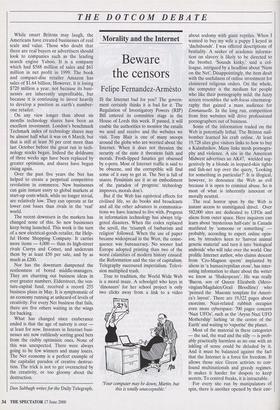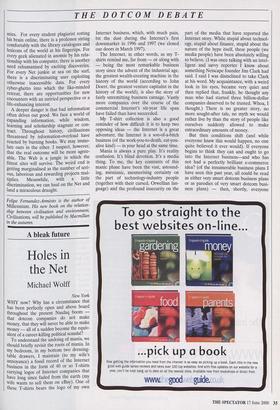Morality and the Internet
Beware the censors
Felipe Fernandez-Armesto
IS the Internet bad for you? The govern- ment certainly thinks it is bad for it. The Regulation of Investigatory Powers (RIP) Bill entered its committee stage in the House of Lords this week. If passed, it will enable the authorities to monitor the emails we send and receive and the websites we visit. Tony Blair is one of many snoops around the globe who are worried about the Internet. When it does not threaten the security of the state it threatens faith and morals. Froth-lipped fanatics get obsessed by e-porn. Most of Internet traffic is said to be obscene, and the corruptible will find some of it easy to get at. The Net is full of snares. Pessimists see it as an embodiment of the paradox of progress: technology improves, morals don't.
But if the Web has equivocal effects for civilised life, so do books and broadcasts and all the other advances in communica- tions we have learned to live with. Progress in information technology has always trig- gered disasters. When the codex replaced the scroll, the `triumph of barbarism and religion' followed. When the use of paper became widespread in the West, the conse- quence was bureaucracy. No sooner had Europe adopted printing than two of the worst calamities of modern history ensued: the Reformation and the rise of capitalism. Telegraphy succoured imperialism. Televi- sion multiplied trash.
True to tradition, the World Wide Web is a moral maze. A schoolgirl who keys in `dinosaurs' for her school project is only two clicks away from a link to a video Your computer may be down, Martin, but this is totally unacceptable.' about sodomy with giant reptiles. When I wanted to buy my wife a puppy I keyed in `dachshunds'. I was offered descriptions of bestiality. A seeker of academic informa- tion on slavery is likely to be directed to the brothel. `Sounds kinky,' said a col- league, intrigued by a headline about `Nuns on the Net'. Disappointingly, the item dealt with the usefulness of online investment for cloistered religious orders. On the whole, the computer is the medium for people who like their pornography mild: the fuzzy screen resembles the soft-focus cinematog- raphy that gained a mass audience for Emmanuelle. In the long run, competition from free websites will drive professional pornographers out of business.
Some of the information traded on the Web is potentially lethal. The Brixton nail- bomber learned his craft online. At least 19,728 sites give visitors links to how to buy a Kalashnikov. Many links mesh pornogra- phy and violence. A site in the American Midwest advertises an AK47, wielded sug- gestively by a blonde in leopard-skin tights and fish-net top over the query, `Looking for something in particular?' It is illogical, however, to denounce the Web as evil because it is open to criminal abuse. So is most of what is inherently innocent or morally neutral.
The real horror spun by the Web is instant access to unmitigated drivel. Over 582,000 sites are dedicated to UFOs and aliens from outer space. Here inquirers can learn about `mysterious half-cats' in Canada mutilated by `someone or something' — probably, according to expert online opin- ion, by intruders keen to `harvest animal genetic material' and turn it into `biological androids' who will take over the world. One prolific Internet author, who claims descent from `Cro-Magnon sperm' implanted by aliens in `a human/reptilian cross', has inter- esting information to share about the writer we know as `Shakespeare'. He was really `Bacon, son of Queen Elizabeth (Mero- vingian/Magdalen/Grail Bloodline)' who `penned the Masonic template for Ameri- ca's layout'. There are 19,522 pages about exorcism. Nazi-related rubbish occupies even more cyberspace: 700 pages concern `Nazi UFOs', such as the `Aryan Nazi UFO Mothership' lurking `at the centre of the Earth' and waiting to `vaporise' the planet.
Most of the material in these categories — the sad, the mad and the silly — is prob- ably practically harmless as no one with an inkling of sense could be deluded by it. And it must be balanced against the fact that the Internet is a force for freedom. It allows those nice Green activists to con- found multinationals and greedy regimes. It makes it harder for despots to keep secrets. To control freaks, it is intractable.
For every site run by manipulators of spin, there is another opened by their ene-
THE DOTCOM DEBATE
mies. For every student plagiarist rotting his brain online, there is a professor sitting comfortably with the library catalogues and lexicons of the world at his fingertips. For every geek alienated in anomie by his rela- tionship with his computer, there is another nerd rehumanised by exciting discoveries. For every Net junkie at sea on the surf, there is a discriminating user exploiting otherwise inaccessible data. For every cyber-ghetto into which the like-minded retreat, there are opportunities for new encounters with an untried perspective or a life-enhancing interest. A deeper danger is that bad information often drives out good. We face a world of expanding information, while wisdom, learning and scholarship stagnate or con- tract. Throughout history, civilisations threatened by information-overload have reacted by burning books. We may inuno- late ours in the ether. I suspect, however, that the real outcome will be more agree- able. The Web is a jungle in which the fittest sites will survive. The weird end is getting marginalised as the number of seri- ous, laborious and rewarding projects mul- tiplies. Meanwhile, with a little discrimination, we can haul on the Net and land a miraculous draught.
Felipe Fernandez-Armesto is the author of Millennium. His new book on the relation- ship between civilisation and environment, Civilisations, will be published by Macmillan in the autumn.











































































 Previous page
Previous page